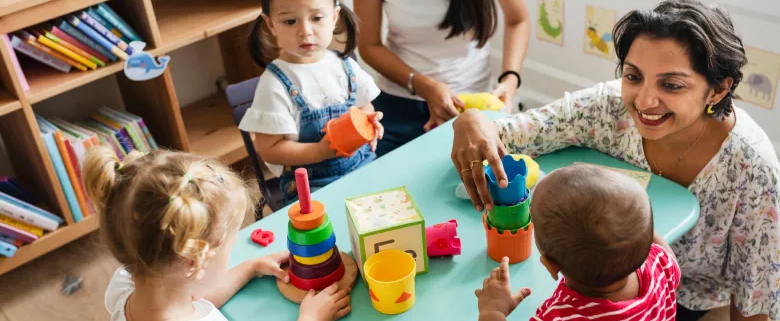How Quality Child Care Can Help Kids When They Go to School
Quality child care is more than just a safe space for children while parents work; it serves as a foundation for a child’s cognitive, social, and emotional development. Early childhood education and nurturing environments play a crucial role in preparing children for school by enhancing their learning abilities, improving social interactions, and fostering a love for education. In this blog, we explore how high-quality child care positively impacts a child’s transition to school and sets them on a path to success.
The Role Of Early Childhood Education In A Child’s Growth:
1. Developing Cognitive and Language Skills
Children who attend quality childcare centers are exposed to structured learning activities that promote cognitive and language development. Through storytelling, singing, and interactive play, young children enhance their vocabulary, improve comprehension, and develop early literacy skills. These foundational skills make it easier for them to grasp new concepts when they enter kindergarten.
Studies show that children who have attended early childhood education programs have a better understanding of numbers, letters, and problem-solving techniques than those who did not. This head start in learning boosts their confidence and curiosity, making the school environment less overwhelming.
2. Enhancing Social and Emotional Skills
One of the biggest challenges children face when starting school is adjusting to new social environments. Quality child care helps children develop crucial social and emotional skills by providing opportunities to interact with peers and caregivers in a structured setting. Through group activities, they learn how to share, cooperate, and resolve conflicts.
These early social interactions foster emotional intelligence, enabling children to regulate their emotions, express themselves effectively, and build healthy relationships. As a result, they are better prepared to adapt to the classroom setting, follow instructions, and work collaboratively with classmates.
3. Instilling a Love for Learning
Children who experience engaging and stimulating activities in childcare settings often develop a natural curiosity and enthusiasm for learning. When learning is made fun through hands-on activities, creative projects, and play-based education, children begin to associate learning with enjoyment rather than pressure.
This positive attitude toward education carries over into their school years, making them more receptive to new subjects and eager to participate in class activities. They become more confident in exploring new ideas, leading to higher academic achievement in the long run.
4. Encouraging Independence and Responsibility
A structured childcare environment teaches children the importance of routines, independence, and responsibility. Simple tasks like tidying up toys, washing hands, and following a daily schedule instill a sense of discipline and accountability. When children transition to school, these habits help them manage their time effectively and follow classroom rules without difficulty.
Additionally, child care fosters self-help skills, such as dressing themselves, managing their belongings, and making choices, which contributes to their confidence and ability to handle new challenges independently.
5. Building Stronger Problem-Solving and Critical Thinking Skills
Through play-based learning and guided activities, children in quality childcare programs develop problem-solving and critical-thinking skills. Whether it’s working on puzzles, participating in group projects, or engaging in creative storytelling, they learn to analyze situations, think critically, and find solutions to problems.
These skills are essential when transitioning to school, as they help children approach academic challenges with confidence and perseverance. A strong foundation in problem-solving also enhances their ability to navigate real-life situations effectively.
6. Providing a Smooth Transition to School
Attending child care before kindergarten helps children become accustomed to a structured learning environment. They become familiar with the concept of classrooms, group learning, and teacher-student interactions, reducing the anxiety associated with starting school. This early exposure minimizes separation anxiety, allowing children to adjust more smoothly to their new learning environment.
Furthermore, children who have experienced quality child care tend to exhibit better classroom behavior, such as listening attentively, following instructions, and respecting teachers and peers. These positive behaviors contribute to a more successful school experience.
7. Supporting Physical and Motor Skill Development
Childcare programs often incorporate physical activities that help develop fine and gross motor skills. Activities like drawing, cutting, climbing, and playing with blocks enhance hand-eye coordination and muscle strength. These physical skills are important for tasks such as writing, using classroom tools, and participating in school sports and activities.
Engaging in regular physical activity also promotes overall health, ensuring children have the energy and stamina needed to actively participate in school.
8. Fostering Strong Parent-Teacher Communication
Quality childcare programs often encourage strong communication between parents and caregivers. This collaboration ensures that children receive consistent support at home and in the classroom. When parents and caregivers work together to reinforce learning and social skills, children experience a smoother transition to school.
Additionally, parents who engage in their child’s early education are more likely to be involved in their school life, positively influencing their academic and social success.
Conclusion
Investing in quality childcare is one of the best ways to prepare children for a successful school experience. The benefits of early childhood education extend far beyond the preschool years, encompassing cognitive and social development, problem-solving skills, and independence. When children grow up in a nurturing and supportive environment, they enter school with confidence, enthusiasm, and a readiness to learn. As a childcare service provider, we assist both parents and education providers by supplying their essential needs for the betterment of children’s growth.




